API Integration
While Savannah provides a number of built-in data sources, your community will likey exist and be active in some systems that it doesn’t know about. In these cases Savannah provides an API Integration Source type that will enable you to push Member and Conversation data directly into your Savannah community.
Create an Integration Source
All data imported into Savannah is associated with a Source object, and API integrations are no different. In order to add your external system to Savannah you must first create an API Integration Source, in the same way as you create other sources.
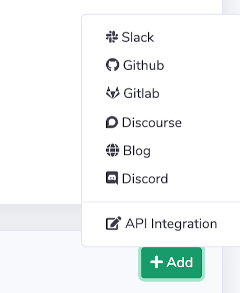
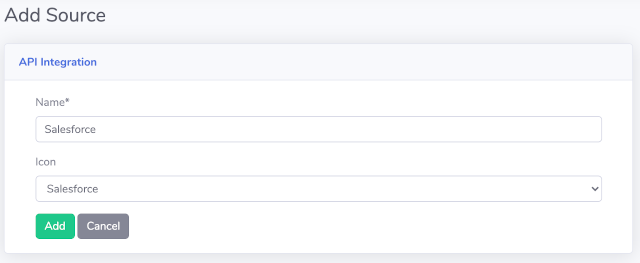
Your Source will be given a unique authorization token that you will use when making calls to the Savannah API. Because each token is associated with a Source, any data added to Savannah using that token will be associated with that Source.

API Basics
Authorization
API calls will need to be authorized using the API token of your Source. This is done by placing it in an HTTP request header:
Authorization: token f32fde77-ebbb-4799-94f7-065846da88bf
Timestamps
Timestamps will always use the format YYYY-MM-DDThh:mm[:ss[.uuuuuu]][+HH:MM|-HH:MM|Z]
Origin IDs
Savannah’s API doesn’t expose internal IDs, instead it uses unique identifiers from your external system to lookup internal records. These are referred to as the origin_id of the record.
You will need to provide an ID for each Identity and Conversation that is unique to your system. These IDs should be unique to your integration source, but do not need to be globally unique for your community. For example, you can have an Identity with the id testuser in your integration source, and also a user with the same identity from a Slack or Github source.
An origin_id can be any string up to 256 characters long. You can use internal ID numbers, unique names or URIs, as long at the resulting string is unique for that data type in your intergration source.
Merging multiple identities into the same Member can be done in Savannah the same way it is for non-API sources.
Repeating API calls
Savannah’s APIs are designed to be idempotent. That means that calling the same API with the same data multiple times will not create duplicate data.
As long as you use the same origin_id each time, subsequent calls will only update the existing data associated with that ID.
Create rather than fail
Whenever an API call references an origin_id for a record that is not already in Savannah, a new record for that ID will be created with minimal information rather than causing the API call to fail with an error.
You will still need to make additional API calls to fill in the missing data for those newly created records, but you will not be required to do that beforehand.
Identities
An Identity is what associates a Member of your community with a Source. Members can (and usually do) have more than one Identity.
The Identity API endpoint is:
https://savannahcrm.com/api/v1/identity/

You can create a new Identity by senting a POST message to the Identity endpoint. Creating an Identiy will also create a Member for that Identity
You may also set tags on a member by passing an array of tag names to the tags field. If a tag by a given name does not already exist, Savannah will automatically create one for you.
curl -X POST -d "@-" -H "Content-Type: application/json" -H "Authorization: token f32fde77-ebbb-4799-94f7-065846da88bf" https://savannahcrm.com/api/v1/identity/ <<EOF
{
"origin_id": "test_user_id",
"username": "test_user",
"name": "Test User",
"email": "test@example.com",
"avatar": null,
"tags": ["test", "foo"]
}
EOF
If a Member with the given Identity already exists, this call will update their information.
Conversations
The Conversation API endpoint is:
https://savannahcrm.com/api/v1/conversation/
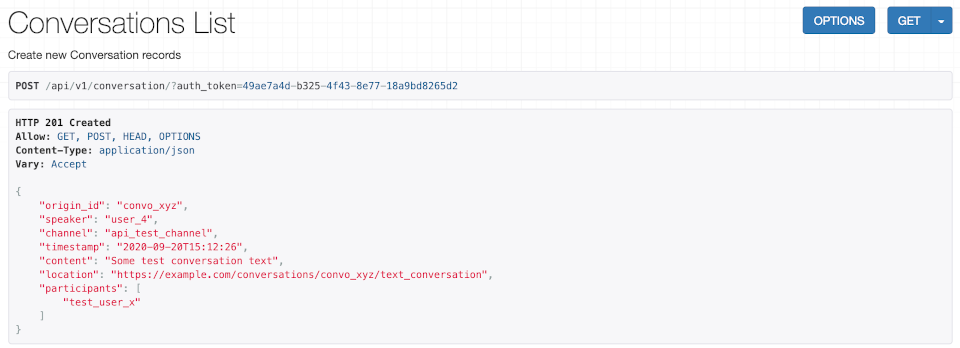
When creating a Conversation you will need to provide certain fields in the form of their respective origin_id. These records will be created in Savannah if they haven’t already been added.
speaker: The id of the person who posted the commentchannel: The id of the channel (however your source defines them) that the conversation happened inparticipants: A list of ids for the people who were tagged, replied to, or otherwise were a participant in this conversation.tags: An array of tag names to be applied to this conversation. If a tag by a given name does not already exist, Savannah will automatically create one for you.
Savannah will create a Connection record between the speaker and any particpants in the conversation.
curl -X POST -d "@-" -H "Content-Type: application/json" -H "Authorization: token f32fde77-ebbb-4799-94f7-065846da88bf" https://savannahcrm.com/api/v1/conversation/ <<EOF
{
"origin_id": "conversation_id",
"speaker": "test_user",
"channel": "example_channel",
"timestamp": "2020-09-20T15:12:26",
"content": "Some test conversation text",
"location": "https://example.com/conversations/conversation_id/test_conversation",
"participants": [
"test_user_x"
],
"tags": ["test", "foo"]
}
EOF
Contributions
The Contribution API endpoint is:
https://savannahcrm.com/api/v1/contribution/
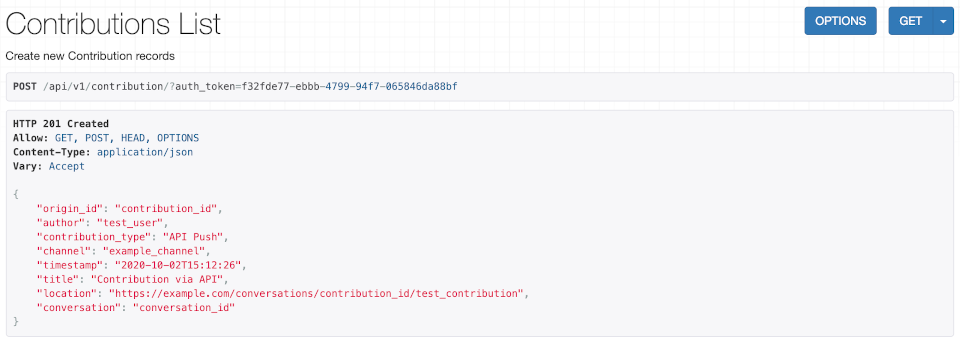
When creating a Contribution you will need to provide certain fields in the form of their respective origin_id. These records will be created in Savannah if they haven’t already been added.
author: The id of the person who made the contributionchannel: The id of the channel (however your source defines them) that the contribution was made in
You must also provide a contribution_type string to that identifies the kind of contribution this is. This string does not need to be an origin_id from your source.
If the Contribution you area adding is associated with an existing Conversation, you can provide the origin_id of the Conversation as the conversation parameter, otherwise leave it as null.
curl -X POST -d "@-" -H "Content-Type: application/json" -H "Authorization: token f32fde77-ebbb-4799-94f7-065846da88bf" https://savannahcrm.com/api/v1/contribution/ <<EOF
{
"origin_id": "contribution_id",
"author": "test_user",
"contribution_type": "API Push",
"channel": "example_channel",
"timestamp": "2020-10-02T15:12:26",
"title": "Contribution via API",
"location": "https://example.com/conversations/contribution_id/test_contribution",
"conversation": "conversation_id"
}
Events
The Event API endpoint is:
https://savannahcrm.com/api/v1/event/
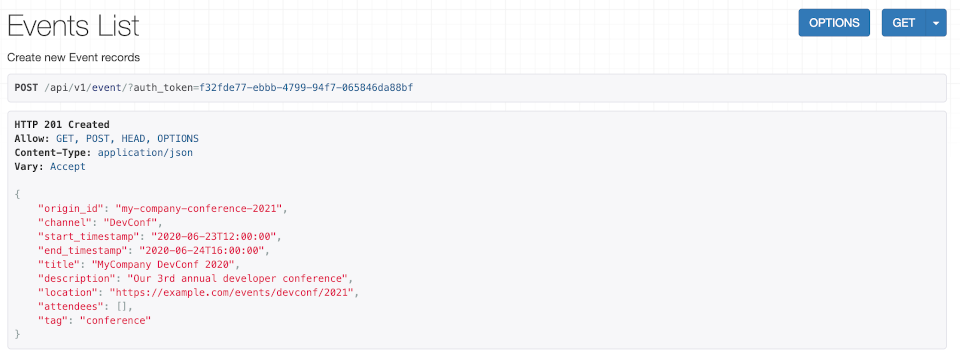
When creating an Event you will need provide a channel under your your API Integration source where it will be listed. If a channel with the given name does not exist, Savannah will create one for you.
curl -X POST -d "@-" -H "Content-Type: application/json" -H "Authorization: token f32fde77-ebbb-4799-94f7-065846da88bf" https://savannahcrm.com/api/v1/event/ <<EOF
{
"origin_id": "my-company-conference-2021",
"channel": "DevConf",
"start_timestamp": "2020-06-23T12:00:00",
"end_timestamp": "2020-06-24T16:00:00",
"title": "MyCompany DevConf 2020",
"description": "Our 3rd annual developer conference",
"location": "https://example.com/events/devconf/2021",
"tag": "conference"
}
You may optionally pass a list of member origin_ids to this endpoint using the attendees property. This is useful if you have already added the members to Savannah and know the entire list of attendees when calling this endoint.
However, more often than not you will want to create the Event record first, and then iteratively add each attendee with their full details. For this, use the EventAttendance endpoint below.
Event Attendees
The EventAttendance API endpoint is:
https://savannahcrm.com/api/v1/event/{event_id}/attendee/
You can optionally add members as attendees of your event. The EventAttendee endpoint is identical to the Identity endpoint, except that members will be marked as having attended the event specified in the URL. Event attendance will set a Member’s first and last seen dates the same way conversations and contributions will.
If a member with a matching origin_id does not exist, Savannah will create one for you.
curl -X POST -d "@-" -H "Content-Type: application/json" -H "Authorization: token f32fde77-ebbb-4799-94f7-065846da88bf" https://savannahcrm.com/api/v1/event/my-company-conference-2021/attendee/ <<EOF
{
"origin_id": "test_user_id",
"username": "test_user",
"name": "Test User",
"email": "test@example.com",
"avatar": null,
"tags": ["test", "foo"]
}
EOF